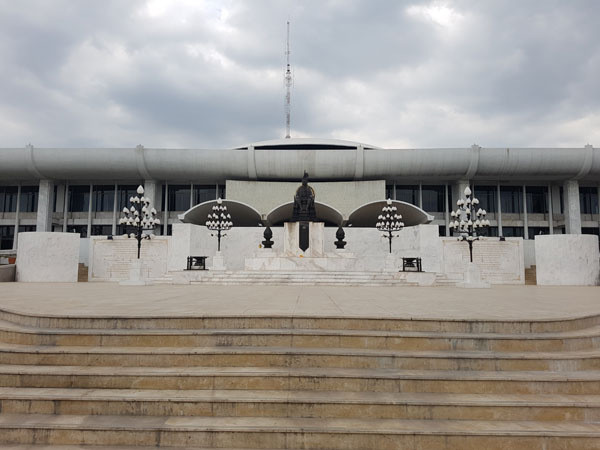Move Forward stimulates reassessment of Thailand’s government

[Photo of the Thai Parliament Museum. Photo Credit to Wikimedia]
A pivotal victory made by the Move Forward Party (MFP) in the general election of Thailand urges the country to reassess their current government form.
Pita Limjaroenrat – leader and advocate of the Move Forward Party (MFP) – astounded Thailand’s political establishment by winning 14.2m votes for Prime Minister, a testament to the uprising democratic inclination.
MFP is a progressive, anti-military party, and a predecessor to Future Forward- a party which assured reform in 2019, but was dismissed after a year.
The MFP outlines similar goals and objectives to abolish the military's influence from the government to return to democracy after military rule foregone by a coup.
Limjaroenrat additionally appealed to modernize the educational curriculum and refine the welfare system.
However, the greatest dispute is to repeal the lèse-majesté law, a law that criminalizes criticism against the monarchy.
Alongside the lèse-majesté law, there has been growing tension between the youth and the ruling class:a clash between evolving democratic values and the endorsement of traditional monarchic principles.
Evidently in 2020, university and high school students conducted a mass protest in objection to the Further Forward dissolvement.
Opposition parties and protests gathered in efforts to remove Prayuth as prime minister and to dissolve parliament, and overall abrogate harsh government critics.
The dissolvement of similar opposition parties were seen as an indication of the military’s meddling in politics and government, as well as prejudiced and weakened inspection of other parties.
Hence, younger generations took this sign as evidence to an oligarchic political system that silences their cries for freedom through violence.
The oligarchic system was seen to root from the military’s ambitions for power that subverts and weakens democratic values.
As a means to target the youth in the election, Limjaroenrat addresses these concerns.
The MFP successfully garnered 14 million party-list votes and 113 constituency seats.
Although MFP has won the general election, it still requires premiership in order to become an MP (Member of Parliament).
Intent to secure premiership, MFP has teamed up with Pheu Thai (PT) and with eight other parties in coalition, compromising a total of 313 MPs among the 500-member National Assembly of Thailand.
Although a safe majority, a premiership is jointly elected by the upper and lower houses.
The Senate of Thailand, the upper house, consists of 250 senators, appointed by the military power during the coup in 2014.
Consequently, the Senate of Thailand is able to countermand the lower house’s choice of prime minister, effectively preventing Moving Forward from establishing a government.
Move Forward has to appeal to the 23 individual senators, to endorse as a nominee.
Although independent from houses, many senators declared to the media they will not be in support of MF, stressing that a prime minister requires loyalty to the royal institution.
Other committees such as the National Anti-Corruption Commission, Electoral Commission and the Constitutional Court have a dearth in political independence.
They acquiesce to the House’s orders, potentially banning Move Forward and Limjaroenrat.
The establishment may push corruption charges on Limjaroenrat, the same technique that displaced the party leader for Further Forward.
However, due to the widespread support, it is highly unlikely Moving Forward will dissolve.
Rural provinces in support were easily reprimanded by the Thai military through the lèse-majesté law, but Move Forward has gathered additional wins in urban centers.
Urban centers historically leaned towards traditional monarchic values, but Move Forward’s win, particularly in Bangkok, suggests that business groups preferred stable governments to political disarray.
Bangkok is the core of Thailand’s industry and the pinnacle of its arts and culture; it is an area crowded with university students who are registered to vote.
Moving Forward’s support base largely branches from Bangkok, seen by the 42 per cent of Move Forward party votes and only 15 percent of the current prime minister’s United Thai Nation party.
Therefore, Thailand is forced to accept Moving Forward’s electoral success and its implication.
Although the legitimacy of Limjaroenrat’s ability to run for premiership remains unclear, Moving Forward’s victories are seen as a momentous landmarks in Thailand’s history.

- Stella Kim / Year 11
- North London Collegiate School Jeju

![THE HERALD STUDENT REPORTERS [US]](/assets/images/logo_student_us.png)
![THE HERALD STUDENT REPORTERS [Canada]](/assets/images/logo_student_ca.png)
